- Home
- Muriel Spark
Curriculum Vitae Page 2
Curriculum Vitae Read online
Page 2
From The Buttercup, as we called the shop, we also obtained eggs of various grades. New-laid eggs were best for breakfast, but preserved eggs which had been laid down in waterglass were cheaper and perfectly adequate for cake-making. One day The Buttercup installed a fascinating egg-illuminator, on which each egg was placed before it was sold. This process, known as candling, proved the freshness of the egg. The inward egg lit up, translucent, proving the egg was good. If it had been a bad egg, it would have been opaque, but I never saw one of those.
Before leaving the shop (as, indeed, every shop), you counted your change very carefully in case of mistakes. This performance was attentively watched by the assistant who served you.
It was with the Buttercup Dairy Company that I associated Robert Louis Stevenson’s lines from my earliest infancy:
One morning, very early, before the sun was up,
I rose and found the shining dew on every buttercup.
And the sparkle and morning-freshness of the shop, and the butter-conjuring girl, formed a mind-picture that accompanied the whole of my youth.
Tea
Sixty years ago is a short time in history. As recently as that I made at least one pot of tea for the family every day. It was delicious tea. Every schoolgirl, every schoolboy, knew how to make that exquisite pot of tea.
You boiled the kettle, and just before it came to the boil, you half-filled the teapot to warm it. When the kettle came to the boil, you kept it simmering while you threw out the water in the teapot and then put in a level spoonful of tea for each person and one for the pot. Up to four spoonfuls of tea from that sweetly odorous tea-caddy would make the perfect pot. The caddy spoon was a special shape, like a small silver shovel. You never took the kettle to the teapot; always the pot to the kettle, where you filled it, but never to the brim.
You let it stand, to ‘draw’, for three minutes.
The tea had to be drunk out of china, as thin at the rim as you could afford. Otherwise you lost the taste of the tea.
You put in milk sufficient to cloud the clear liquid, and sugar if you had a sweet tooth. Sugar or not was the only personal choice allowed.
Everyone who came to the house was offered a cup of tea, as in Dostoyevsky. What his method of making tea was I don’t know. (Tea from samovars must have been different, certainly without milk, and served in a glass set in a brass or silver holder.)
Tea at five o’clock was an occasion for visitors. One ate bread and butter first, graduating to cakes and biscuits. Five o’clock tea was something you ‘took’. If you had it at six you ‘ate’ your tea.
Tea at half-past six was high tea, a full meal which resembled breakfast. You had kippers, smoked haddock (smokies), ham, eggs or sausages for high tea. Potatoes did not accompany this meal. But a pot of tea, with bread, butter and jam, was always part of it.
Auntie Gertie and Florrie Forde
‘The English’ in the Edinburgh of my childhood were considered to be superficial and hypocritical. And over-dressed. My mother, who was English, used to come and fetch me from school. It was my daily dread that she should open her mouth and thus betray her suspect origins. ‘Foreigners’ were fairly tolerated but ‘the English’ were something quite different. It was not only the accent that betrayed Englishness. It was also turns of phrase and idiomatic usage. One day, outside the school, I heard my mother remark to another mother, ‘I have some shopping to do.’ I nearly died. She should have said, ‘I’ve got to get the messages,’ that’s what she should have said. My mother also wore a winter coat trimmed with beige fox fur in the style of the then Duchess of York, now the Queen Mother (who still, and sublimely, wears those fox-trimmed coats). This was entirely out of place. My mother ought to have worn tweed or, in very cold weather, musquash. My mother wore peach-coloured silk or rayon stockings, which should have been lisle-thread, grey. It was only through her natural amiability to everyone she encountered that she managed to squeeze by the censor. She completely enjoyed meeting and greeting people. Before I was born she had been a ‘teacher of pianoforte’. I still have her brass plate inscribed to that effect.
My father spoke with a strong Edinburgh accent, and although he was a Jew, having been born and educated in Edinburgh of Scottish-Jewish parents, he wore the same sort of clothes as the other fathers and spoke as they did, about the same things. So he was no problem. He was an engineer. I still have the contract of his seven-year apprenticeship signed, in schoolboy calligraphy, ‘Bertie Camberg’.
‘Scotch or English?’ was a game played by rough boys. They would tie a stone to a length of string and whirl it around, accosting other boys with the challenge: ‘Are you Scotch or English?’ The invariable response was to say ‘English’ and run fast. The essence of the game was the ensuing chase and stone-batter. There were no real English boys involved.
Another version of the game was ‘Scotch or Irish?’, both harking back to what Wordsworth called,
… old, unhappy, far-off things
And battles long ago.
In an old book of memoirs (Mary Somerville edited by her daughter Martha Somerville, 1873) the author’s mother recalls in her Scottish childhood c. 1788 playing a game called Scotch and English, which ‘represented a raid on the debatable land, or Border between Scotland and England, in which each party tried to rob the other of their play-things. The little ones were always compelled to be English, for the bigger girls thought it too degrading.’
At home, if I left the tap running in the bathroom, my mother would say, ‘Turn off the tap,’ but my father’s command was, ‘Turn off the well.’
Taps were also wells to his young sister, my Auntie Gertie, as they were to our God-fearing neighbours. Auntie Gertie stayed with us for a while. She went out with boyfriends, dressed in a short-skirted navy blue outfit and a cherry-red hat that hugged her bobbed hair. She regarded most of her boyfriends as objects of amusement, regaling us, on her return, with pointed, merry anecdotes. Once, when she had been taken to admire a beauty spot, my auntie had remarked, in her lively way, ‘Very pictureskew!’ To which the boyfriend solemnly replied, ‘Oh, is that how it’s pronounced?’
We often laughed at others in our house, and I picked up the craft of being polite while people were present and laughing later if there was anything to laugh about, or criticizing later if there was anything to deplore. At this time I must have been four or five. Sometimes people got nicknames for use amongst ourselves. Like other nuggets of my early childhood, they continue to gleam in my mind, although often I forget who the people were to whom the nicknames were attached. One friend of a friend, whom my mother and I encountered sometimes at the putting green of Bruntsfield Links, was called the Ray of Sunshine. She was lodging with a couple known to my parents; the husband had assured them that this lady was ‘a ray of sunshine’. In reality she looked terribly grim as she tried in a vexed way to get her golf ball into the hole. ‘We met the Ray of Sunshine,’ my mother merrily told my father when we got home for tea.
I had been given a dolls’ pram constructed for twins, with a folding hood at each end. My dolls, Red Rosie and Queenie, sat facing each other. I remember one day I was crying and bawling for some reason. My father fetched a face-cloth and wiped the faces of my two dolls, bidding them each not to cry. I was so fascinated by this performance that I stopped crying, and I distinctly recall experiencing a sensation or instinct that, if I could have put it into words, would have been ‘I’m not taken in by his ruse, but at the same time what a good child-psychologist he is!’
It must have been about 1923, just before I went to school, that I went to my first theatre show, a matinée at the Lyceum. It was surely a public holiday, for neither Auntie Gertie nor my father went to work. Instead, my parents left me in the charge of Gertie and went off in high spirits to the Musselburgh races. Presumably, my brother, five years my elder, went with them or had been sent somewhere else. Auntie Gertie and I were alone. We had our lunch, which was ‘dinner’ to us. She then dressed me in
my best clothes and, herself looking very natty in her cherry hat and her skirt that showed her knees, conveyed me forth ‘to see Florrie Forde’.
Florrie Forde was a music-hall performer. The house was packed. I had never been in a house so big, in such a big room, with so many people sitting in tiers going up and up. The curtain rose to reveal buxom Miss Forde, dressed in a one-piece suit resembling the modern body-tights, all gold-bronze spangles.
There was a thunder of applause. I was accustomed to hearing applause, because my parents used to have ‘musical evenings’, when my mother played, and my father sang ‘Forever and Forever’, or my mother herself sang ‘Rose in the Bud’; on such occasions our guests would clap their hands warmly at the end of the piece. But this affair of Florrie Forde down there on the stage was so vastly public that I was full of wonder at how she could carry it all without apparently feeling shy.
She carried it off as if the stage were her own home. Other people on the stage came and went, especially men in evening dress, but Florrie in her spangles dominated the enormous house. She sang to the accompaniment of an orchestra and also danced. Only one of her numbers has remained in my memory. Miss Forde reclined glittering in the middle of the stage beside an enormous wireless set with multi-coloured, illuminated ‘valves’, which looked like light bulbs. Radios with valves were then a luxury in our parts. My brother had only recently constructed a wireless set that was operated by a small lump of uneven and shining metal called ‘the crystal’ and a wire called ‘the cat’s whisker’. It was a complicated and awe-inspiring contraption, which, when attached to headphones (thirty shillings) and acoustically tuned in with a tender scratching of the cat’s whisker on the crystal, gave us a fugitive and intermittent programme from the BBC, London. A wireless set with valves (whatever they actually were) was as yet beyond our means.
But not beyond Florrie Forde’s. She rested on one elbow and with the other hand twiddled the knobs on her glamorous wireless set; meanwhile she sang a slow song called ‘Dream, Daddy’.
Auntie Gertie and I were home before my parents returned from the races. By the time they arrived the kitchen table was set for our tea. We hadn’t yet sat down; my parents were full of which horses had won a place and which, in my father’s words, were ‘still coming up the field’. And what had we done with our day?
‘We went to see Florrie Forde,’ said Auntie Gertie, to such great amusement of my parents that my auntie looked at me in an almost fellow-juvenile amazement. My father and mother couldn’t stop laughing. ‘Gertie took her to see Florrie Forde,’ my mother managed to splutter.
‘They’re killing themselves laughing,’ murmured my auntie.
And why they were standing there laughing in the kitchen, falling into each other’s arms in their mirth, I did not know and will never know.
Mrs Rule, Fish Jean and The Kaiser
I was fascinated from the earliest age I can remember by how people arranged themselves. I can’t remember a time when I was not a person-watcher, a behaviourist. I was also an avid listener. It seems to me that my parents’ friends and the people who called at our small flat were endless. I can remember the names and faces of people dating from my pre-school years far better than any others at any other period of my life.
Most important to me were Mrs Rule and her husband Professor Rule. They were a young American couple; he, originally from New Zealand, was already a Presbyterian minister but was doing a further course in theology at the University of Edinburgh. They stayed with us for a time, during which a pretty baby (born in a nursing home in Edinburgh) appeared. I looked over the crib at this wonder. I also recall how impressed my mother was when Professor Rule washed the baby’s clothes. I remember Mrs Rule by the fireside with her dimples and an exciting set of cards one-inch square, each with a letter on it. With these she taught me to read, egged on by Andrew K. Rule DD, as I found out her husband was, when I was well able to read his name on an envelope. I was between the ages of three and four. It was an early start, although in Edinburgh at that time it was not unusual for children to read and write fluently before they were five. The firelight played on Mrs Rule’s hands and face, on Professor Rule’s bearded smile, and on my lettered, red-backed cards on a tray before me, as I sat at the fire on a low puffy stool, while Mrs Rule declared that a ‘t’ and an ‘h’ together sounded ‘th’. The Rules went home to America, from where they wrote letters to my mother, leaving with me the precious cards.
It is only more recently that I have been able to confirm the reality of my impressions of this exciting and kind couple. My brother tells me that Charlotte Rule played the piano excellently, which must have delighted my mother. Philip also remembers how beautiful she was. Charlotte Rule died after their return to the United States. The daughter of Andrew K. Rule’s second marriage, Barbara Below, has been a valuable source of corroboration of the images of my infancy. When I told her, for instance, that her father taught us to make popcorn (and I can still see the popping corn in the pan held over the fire), Mrs Below confirmed that her father told her how, all those years ago, he showed his Scottish friends how to make popcorn.
I knew about everyone who wrote letters to my parents and everyone who called at the house. We had a spatially small life, and my mother could never forbear to comment on any happening. I used to love the doorbell to ring.
It was a joy to go out visiting with my mother. No special arrangements were made to entertain children. We were just brought along, and we were expected to sit quietly. Not all children liked to do this, but for me it was better that way. I liked to listen. Not only did I feel at home with the immense list of characters who peopled our lives, and who largely ignored me, but there were also those whom I knew by hearsay, and often I touched people who had touched real history.
Such a person was Mrs Lipetz as she was to us, Susan to her husband. I was aware that she was elderly. She sat every afternoon at her bow-fronted window on their ground-floor flat in Bruntsfield Crescent, a sweep of tall houses that had been constructed in 1870 and that one could see from our front windows. Mrs Lipetz had been born in Alsace-Lorraine but spoke without a foreign accent. One day, when we went to see her, I heard her tell how, when she was a schoolgirl in Alsace-Lorraine, after the Franco-Prussian war, the children had to run and hide their French books because the Kaiser was visiting the school. This must have been in 1871, after the peace treaty of Frankfurt, when France ceded Alsace-Lorraine to the Germany of Kaiser Wilhelm I. And it still amazes me to reflect that the childhood experience of my friend Mrs Lipetz going back to 1871 coincided with the year of publication of Middlemarch by George Eliot, The Descent of Man by Charles Darwin and Through the Looking Glass by Lewis Carroll. At the time, of course, I had no historical awe, only an attraction to Mrs Lipetz’s words ‘run and hide our French books’ and ‘the Kaiser’. For a while I confused this Kaiser with the other Kaiser, his grandson, about whom people still talked. The Great War had only been over a few years. But then I was told that Mrs Lipetz’s Kaiser was dead.
Another legendary character whom I missed by being born just too late was Fish Jean, who was much reminisced over by my father and his friends. (‘Do you mind Fish Jean?’ they would say, meaning, do you remember her?) Whether Fish Jean was the same as a certain Herrin’ Jenny of Edinburgh fame, I doubt. It seems to me they were two characters, Herrin’ Jenny probably fictional, preceding Fish Jean. The wonder of Fish Jean was not that, like other fish-wives of the fairly prosperous Newhaven fishing community, she went through the streets crying her wares, but that she did so in such flamboyant style. The driving seat of her horse-cart had to be made specially wide to take Fish Jean’s great girth; she wore large diamond rings on all her fingers down to the knuckles, and would plunge these diamond-covered hands in amongst her glittering herrings and mackerels, proudly to serve her customers.
Another person I never met except through hearsay was Emmeline Pankhurst, the leader of the women’s rights movement of those days. Their main
aim was to obtain the vote for women. My maternal grandmother, Adelaide Uezzell, in the Watford group of the Suffragette movement (as they called themselves), had marched with Mrs Pankhurst, carrying an umbrella, as they all did. My grandmother told me about these events, from an early age. But it was too late for me to know or see Mrs Pankhurst. I had to imagine the scene.
Dead, both dead, Mrs Lipetz’s Kaiser and my father’s Fish Jean, before I could even set eyes on them. And my grandmother’s Mrs Pankhurst – to me only an item of hearsay. This was something inexplicable.

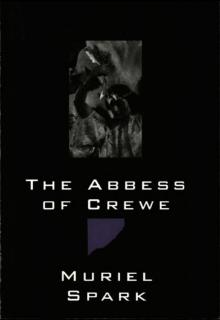 The Abbess of Crewe: A Modern Morality Tale
The Abbess of Crewe: A Modern Morality Tale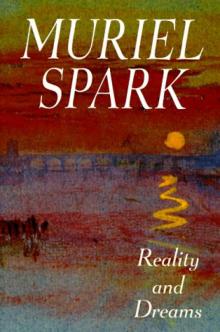 Reality and Dreams
Reality and Dreams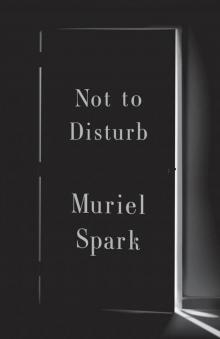 Not to Disturb
Not to Disturb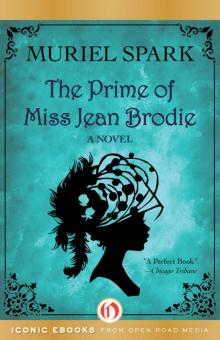 The Prime of Miss Jean Brodie
The Prime of Miss Jean Brodie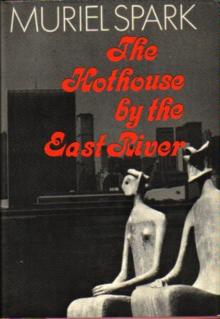 The Hothouse by the East River
The Hothouse by the East River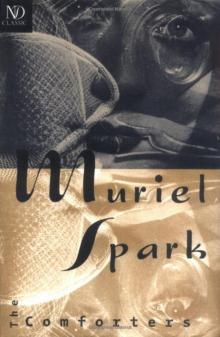 The Comforters
The Comforters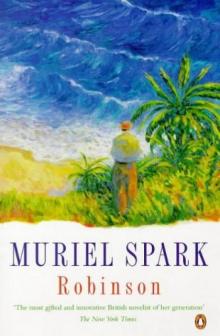 (1958) Robinson
(1958) Robinson Unknown
Unknown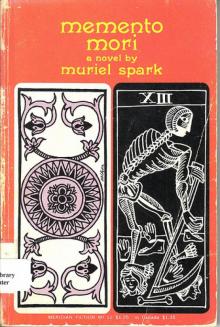 Memento Mori
Memento Mori The Finishing School
The Finishing School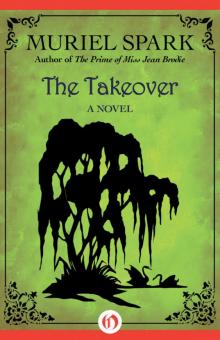 The Takeover
The Takeover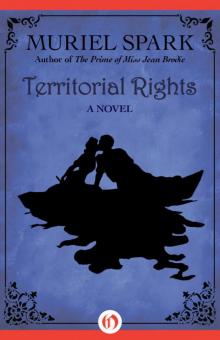 Territorial Rights
Territorial Rights The Complete Short Stories
The Complete Short Stories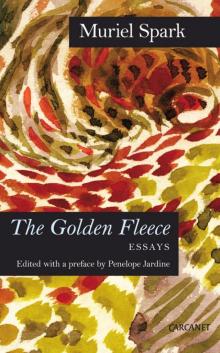 The Golden Fleece: Essays
The Golden Fleece: Essays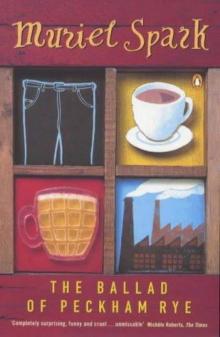 The Ballad of Peckham Rye
The Ballad of Peckham Rye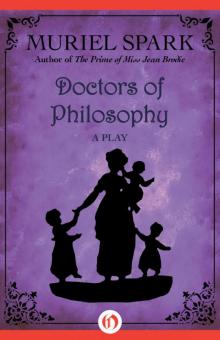 Doctors of Philosophy: A Play
Doctors of Philosophy: A Play The Mandelbaum Gate
The Mandelbaum Gate Loitering With Intent
Loitering With Intent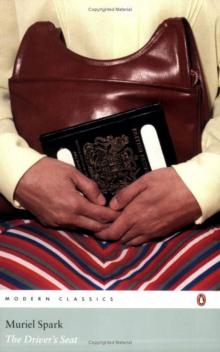 The Driver's Seat
The Driver's Seat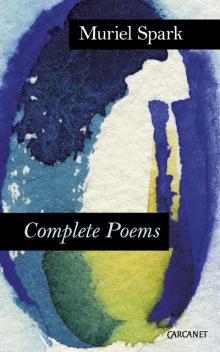 Complete Poems: Muriel Spark
Complete Poems: Muriel Spark Symposium
Symposium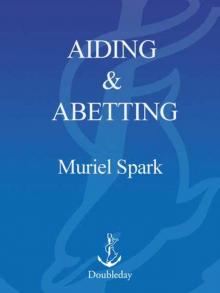 Aiding and Abetting
Aiding and Abetting The Golden Fleece
The Golden Fleece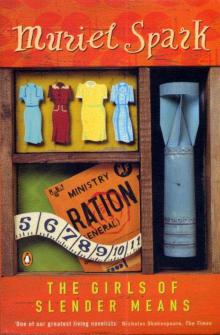 The Girls of Slender Means
The Girls of Slender Means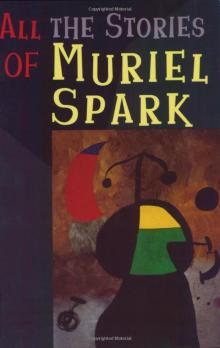 Alice Long’s Dachshunds
Alice Long’s Dachshunds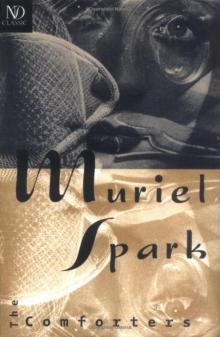 (1954) The Comforters
(1954) The Comforters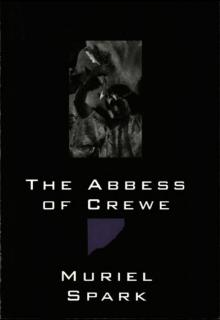 The Abbess of Crewe
The Abbess of Crewe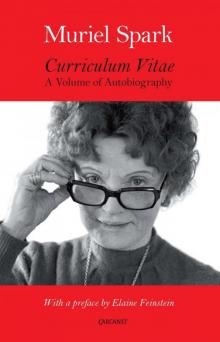 Curriculum Vitae
Curriculum Vitae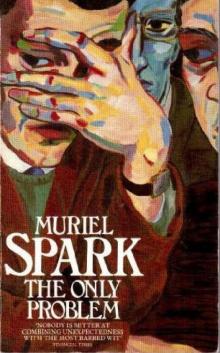 The Only Problem
The Only Problem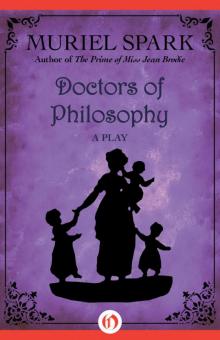 Doctors of Philosophy
Doctors of Philosophy